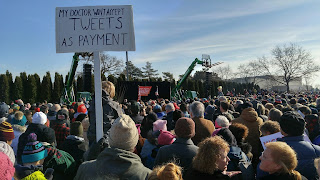I have wanted to speak to this topic so now that it is back
in the news seems like a good time.
I will provide a “Thought Experiment” shortly but first let
me ask this question: Does it pass the basic common sense test to think that 3
million undocumented folks, who already face deportation, would all risk
imprisonment and deportation to cast one illegal vote? These people usually
keep a low profile and stay away from unnecessary contact with governmental
units.
Thought Experiment
Suppose you wish to swing an election by 1% and the total
number of people voting is 1 million. That makes 10,000 people you need to
hire.
You will need a good sized organization to do this. You need
to contact all these people and get their agreement. Then you need to give them
the name of a deceased voter or former voter that has moved away all coordinated with
the correct precinct number. And you need to pay them.
How much do you need to pay someone to risk imprisonment for an illegal vote? Let’s say $10 would do it. So you need to have $100,000 for this project.
What is your measure of success since there is no way to
tell if they voted for the designated candidate or if they voted at all? If a
few take your money and do not vote as directed, you do not achieve the 1%
effect.
{Thanks to Tom Johnson for informing me on this subject.}
For more on this subject, here is Josh Marshall's take including a number
of links to other background material.
Real Election Fraud
The above discussion regards “voter fraud by impersonation”,
the usual crime that is meant to be curbed by the various state laws that we
hear about. Real election fraud, that which can be effective in swinging an
election, is that where major behind-the-scenes cheating can occur. In this
case poll workers permit ballot box stuffing or other means to manipulate the election
results.
State and local laws that pretend to curb
impersonation fraud are undemocratic and clearly are intended to limit voter
participation. It is not possible to have any significant effect on an election
by the few cases that may occur.


